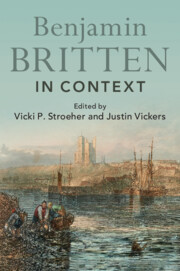Book contents
- Benjamin Britten in Context
- Composers in Context
- Benjamin Britten in Context
- Copyright page
- Dedication
- Contents
- Figures
- Tables
- Notes on Contributors
- Acknowledgements
- Bibliographic and In-Text Abbreviations
- Prologue
- Part I The Britten Circle(s)
- Part II British Musical Life
- Part III Britten and Other Composers
- Part IV Wordsmiths, Designers, and Performers
- Chapter 24 W. H. Auden
- Chapter 25 Eric Crozier
- Chapter 26 Two Librettists
- Chapter 27 The Wise, Queer Heart of Englishness
- Chapter 28 William Plomer’s Poetics of Exile at Home
- Chapter 29 ‘Don’t Colour Them, the Music Will Do That’
- Chapter 30 Designing and Dancing Britten
- Chapter 31 Pears as Illuminator, Interpreter, and Inspiration
- Chapter 32 Britten’s Singers
- Chapter 33 Britten’s Performers: Those Most ‘Instrumental’
- Part V British Sociocultural, Religious, and Political Life
- Further Reading
- Index
Chapter 24 - W. H. Auden
from Part IV - Wordsmiths, Designers, and Performers
Published online by Cambridge University Press: 31 March 2022
- Benjamin Britten in Context
- Composers in Context
- Benjamin Britten in Context
- Copyright page
- Dedication
- Contents
- Figures
- Tables
- Notes on Contributors
- Acknowledgements
- Bibliographic and In-Text Abbreviations
- Prologue
- Part I The Britten Circle(s)
- Part II British Musical Life
- Part III Britten and Other Composers
- Part IV Wordsmiths, Designers, and Performers
- Chapter 24 W. H. Auden
- Chapter 25 Eric Crozier
- Chapter 26 Two Librettists
- Chapter 27 The Wise, Queer Heart of Englishness
- Chapter 28 William Plomer’s Poetics of Exile at Home
- Chapter 29 ‘Don’t Colour Them, the Music Will Do That’
- Chapter 30 Designing and Dancing Britten
- Chapter 31 Pears as Illuminator, Interpreter, and Inspiration
- Chapter 32 Britten’s Singers
- Chapter 33 Britten’s Performers: Those Most ‘Instrumental’
- Part V British Sociocultural, Religious, and Political Life
- Further Reading
- Index
Summary
Auden’s poetry and ideology were shaped by each era and circumstance in which he lived and worked and by those by whom he was surrounded. His early views on politics, religion, sexuality, and the importance of art, music, and poetry to society – all of which defined the poet as Britten knew him in the 1930s and early 1940s – underwent some form of revision thereafter, providing fodder for those critics who sought to conscript him to the turbulent period leading up to and including the Second World War, hailed by many as the ‘golden age’ of his poetry. In England, particularly, some scholars have posited that Auden’s rejection of his ‘age’ – and his country in 1939 – did damage to both his contemporary and posthumous reputations, going so far as to posit that he had squandered his opportunity to be considered that nation’s greatest poet of the twentieth century. As this chapter explores, Auden’s outlook on the varying matters that crept into his poetry was complex and often contradictory.
Keywords
- Type
- Chapter
- Information
- Benjamin Britten in Context , pp. 215 - 222Publisher: Cambridge University PressPrint publication year: 2022

